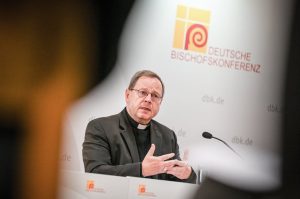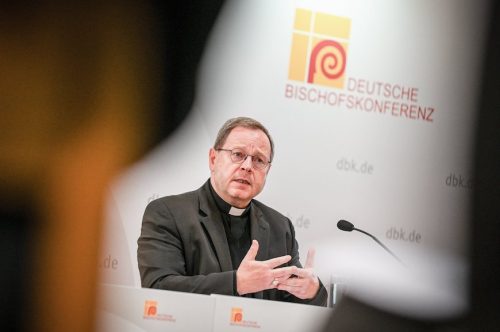By Justin McLellan | Catholic News Service
VATICAN CITY (CNS) — Germany’s bishops do not have the authority to establish a permanent decision-making body of bishops and laypeople that top Vatican officials said would supersede the authority of the country’s bishops’ conference, according to a letter from the officials published Jan. 23.
In their message to Bishop Georg Bätzing, president of the German bishops’ conference, the Vatican officials addressed questions surrounding the establishment of a “Synodal Council” to advise the church in Germany “on major developments in the church and in society” and “take fundamental decisions” on matters that go beyond the diocesan level.
The council was approved in September by bishops and lay members of the country’s Synodal Assembly. The assembly is responsible for discussing, amending and voting on documents related to concerns addressed by Germany’s Synodal Path, which was launched in 2019 in response to the country’s clerical abuse scandal.
“We wish to make it clear that neither the Synodal (Path), nor any body established by it, nor any episcopal conference has the competence to establish the ‘Synodal Council’ at the national, diocesan or parish level,” said the letter signed by Cardinal Pietro Parolin, Vatican secretary of state, Cardinal Luis Ladaria, prefect of the Dicastery for the Doctrine of the Faith, and Cardinal Marc Ouellet, prefect of the Dicastery for Bishops.
The three cardinals said the letter was approved by Pope Francis.
“The most weighty doctrinal concern” raised by the approval of the Synodal Council, the three Vatican officials said, is how it relates to a bishop’s responsibility for teaching and governance, which “can be exercised only in hierarchical communion” with the pope and the whole college of bishops, as taught by the Second Vatican Council’s Dogmatic Constitution on the Church.

In response to the letter, Bishop Bätzing issued a statement Jan. 23 declaring the Vatican’s concerns “unfounded,” and explaining that the Synodal Council would not “stand over the bishops’ conference or undermine the authority of individual bishops.”
“No one questions the authority of the episcopate,” he wrote.
Bishop Bätzing added that while “the Holy See sees the danger of a weakening of the episcopal office,” he instead sees “synodal consultation almost as a strengthening of this office.”
During their “ad limina” visits to Rome in November, Germany’s bishops had a joint meeting with the heads of Vatican dicasteries. At that meeting, the three cardinals expressed concerns that the German bishops were allowing participants in the Synodal Path to adopt positions in contrast to the faith of the universal church, particularly regarding sexuality and women’s ordination.
Responding to what Bishop Bätzing called “legitimate and necessary” questions from German bishops about their participation in the Synodal Council, the Vatican reiterated a message it sent to the bishops in July 2022, stating that Germany’s Synodal Path “is not empowered to oblige the bishops and the faithful to adopt new forms of governance.”
The president of the German bishops’ conference said the letter from the Vatican will prompt Germany’s Synodal Path to “think much more intensively about the forms and possibilities of synodal consultation and decision making,” but he insisted the letter ultimately does not call into question the formation of the Synodal Council.
The three cardinals said they wrote after the heads of five German dioceses — Cologne, Eichstätt, Augsburg, Passau and Regensburg — wrote to the Vatican in December asking if they could be compelled by other German bishops to participate in the Synodal Committee that is organizing the Synodal Council. The Vatican officials said they do not have to participate since decisions of the Synodal Assembly “cannot limit the authority of the bishops’ conference and are not binding on individual bishops.”






















